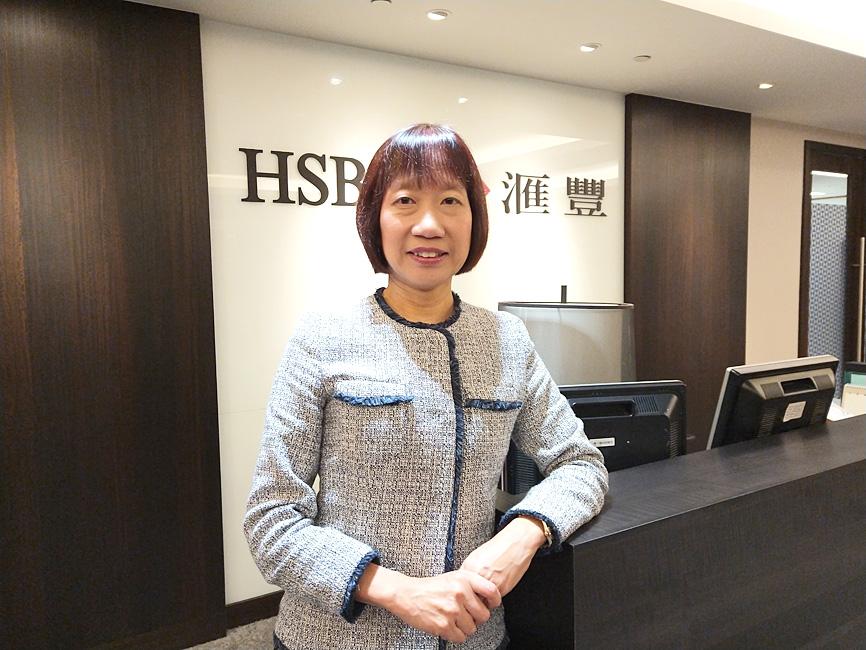HSBC Holdings PLC’s global private banking and wealth management division has an upbeat outlook for Taiwan, the only North Asian market for which it had raised its outlook, as the domestic semiconductor sector is expected to continue to benefit from digitalization worldwide, it said yesterday.
Although the semiconductor sector has posted robust profit growth this year, it is likely to expand further next year thanks to a rising demand for chips, Hong Kong-based chief investment officer for Asia Fan Cheuk Wan (范卓雲) told a news conference.
Next year, semiconductor companies’ earnings per share are likely to grow at a slower pace, due to this year’s high comparison base, but would not lose steam, as more non-tech industries are digitalizing and new applications would be developed for the “metaverse,” a virtual universe facilitated by virtual reality technology, Fan said.

Photo: Lee Ching-hui, Taipei Times
“Some companies raised prices for their advanced process technology or products this year, and the effect on profits might become more evident next year,” chief investment officer for North Asia Patrick Ho (何偉華) said.
In Asia, HSBC has also raised its outlook for Singapore, Thailand and Indonesia, as their economies are expected to benefit from high rates of vaccination against COVID-19, Fan said.
On Tuesday, PGIM Securities Investment Trust Enterprise Co (PGIM, 保德信投信) forecast that the combined profits of local companies next year would grow at a single-digit percentage rate next year, after advancing 70 percent annually to NT$4 trillion (US$143.86 billion) this year.

Photo: Chang Hui-wen, Taipei Times
Profit momentum this year can mainly be attributed to gains in the electronics, shipping and conventional industries, PGIM fund manager Bevan Yeh (葉獻文) told a news conference in Taipei.
Next year, the electronics sector is likely to see a 10 percent rise in profits, but conventional industries are expected to be affected by the rising cost of raw materials as inflation surges worldwide, Yeh said.
It is difficult to predict when freight rates might return to normal levels in the shipping sector, as congestion at seaports worldwide has persisted longer than expected, Yeh added.
“As for the metaverse, we think that it is more like a slogan, as no firm has so far really benefited from new business related to the concept. But it is worth paying attention to how the industry will develop based on the concept,” Yeh said.
Taiwan Semiconductor Manufacturing Co (台積電) is expected to have a rosier second half of next year than the first, as the company has to negotiate with governments worldwide about setting up new factories, Yeh added.
Local stocks next year are likely to experience a “smile curve”: starting high in the first quarter, falling in the second and third quarters, and recovering in the fourth quarter, he said.
The net selling of local shares by foreign institutional investors might continue next year, as it has happened for two consecutive years, he said.

Quanta Computer Inc (廣達) chairman Barry Lam (林百里) is expected to share his views about the artificial intelligence (AI) industry’s prospects during his speech at the company’s 37th anniversary ceremony, as AI servers have become a new growth engine for the equipment manufacturing service provider. Lam’s speech is much anticipated, as Quanta has risen as one of the world’s major AI server suppliers. The company reported a 30 percent year-on-year growth in consolidated revenue to NT$1.41 trillion (US$43.35 billion) last year, thanks to fast-growing demand for servers, especially those with AI capabilities. The company told investors in November last year that

Taiwanese suppliers to Taiwan Semiconductor Manufacturing Co. (TSMC, 台積電) are expected to follow the contract chipmaker’s step to invest in the US, but their relocation may be seven to eight years away, Minister of Economic Affairs J.W. Kuo (郭智輝) said yesterday. When asked by opposition Chinese Nationalist Party (KMT) Legislator Niu Hsu-ting (牛煦庭) in the legislature about growing concerns that TSMC’s huge investments in the US will prompt its suppliers to follow suit, Kuo said based on the chipmaker’s current limited production volume, it is unlikely to lead its supply chain to go there for now. “Unless TSMC completes its planned six

Intel Corp has named Tasha Chuang (莊蓓瑜) to lead Intel Taiwan in a bid to reinforce relations between the company and its Taiwanese partners. The appointment of Chuang as general manager for Intel Taiwan takes effect on Thursday, the firm said in a statement yesterday. Chuang is to lead her team in Taiwan to pursue product development and sales growth in an effort to reinforce the company’s ties with its partners and clients, Intel said. Chuang was previously in charge of managing Intel’s ties with leading Taiwanese PC brand Asustek Computer Inc (華碩), which included helping Asustek strengthen its global businesses, the company

Power supply and electronic components maker Delta Electronics Inc (台達電) yesterday said second-quarter revenue is expected to surpass the first quarter, which rose 30 percent year-on-year to NT$118.92 billion (US$3.71 billion). Revenue this quarter is likely to grow, as US clients have front-loaded orders ahead of US President Donald Trump’s planned tariffs on Taiwanese goods, Delta chairman Ping Cheng (鄭平) said at an earnings conference in Taipei, referring to the 90-day pause in tariff implementation Trump announced on April 9. While situations in the third and fourth quarters remain unclear, “We will not halt our long-term deployments and do not plan to